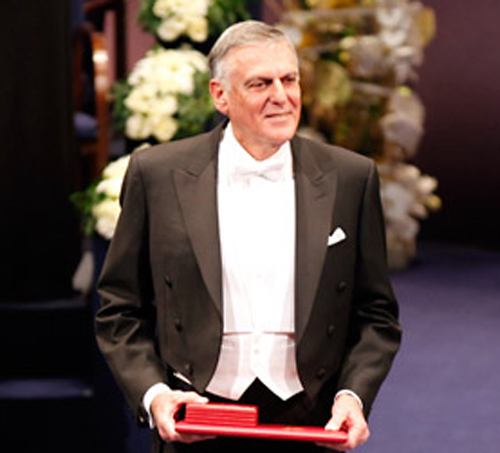Nobel laureate's mantra: Science education, tech entrepreneurship
KATHMANDU: Nobel laureate Prof Dan Shechtman suggested that Nepal could motivate the country’s younger generation to establish new technological ventures, saying technological entrepreneurship was a key to the world peace and prosperity.
Speaking at a talk programme organised on the sidelines of the 13th International Conference on Quasicrystals (ICQ13) in Kathmandu, the renowned material scientist, who won the Nobel prize for Chemistry in 2011 for the discovery of quasicrystals, said that technological entrepreneurship was possible only after putting the real science education in nation’s top priority list.
“Nepal can inspire engineers, scientists, medical doctors and computer experts among others for the technological startups,” he said, prescribing the angels, strategic partners, bootstrapping and venture capital funds could be the sources of investment for the startups.
Good basic education to all as well as good engineering and science education, supportive government policy, free market economy and corruption-free society were the basic elements that always helped empowering the entrepreneurship, Prof Shechtman added.
“Unstable economies and population growth as well as urbanisation and education to women are the major challenges to technological revolution,” the professor of material science at Technion, a public research university in Haifa, Israel, shared.
According to him, innovation which leads to entrepreneurship is mainly concerned with the national democracy, social equality and lack of fear from authority.
The government could form a chief scientist office every ministries and also support individual innovative startups, he suggested.
Prof Shechtman also highlighted that there was a challenge for every nations to make school-going children like science. “A real science education is the need of hour,” he said.
Saying that the trend of population growth moved from expanding to stationary, the scientists said that there was also challenge to manage an ageing population when the age-wise trend reached to a stage of contracting.
Shechtman who discovered quasiperiodic crystals in April 1982 as a visiting scholar at the National Bureau of Standards in Maryland, US, has won the Nobel Prize in Chemistry in 2011. “Do give up the fear of failure,” the scientist further added.
Ambassador of Israel to Nepal Yaron Mayer said that Nepal could learn from Israel that how technological entrepreneurship could overcome all challenges hindering the nation’s peace and prosperity. “Shechtman is a role model in Israel and in the world,” he termed.
The talk programme was jointly orgnaised by the Embassy of Israel in Nepal, Non-Resident Nepali Association and Nepal Science Foundation Trust in support with Nepal Forum of Science Journalists and Asian Science Camp Alumni Association.






